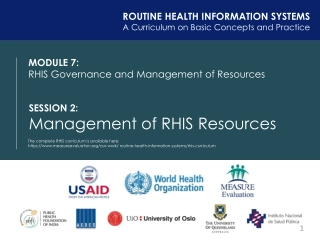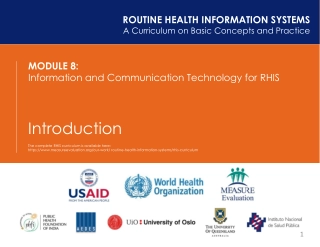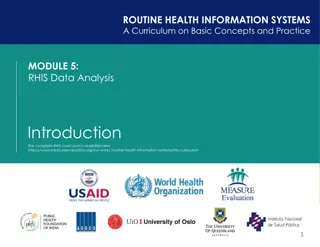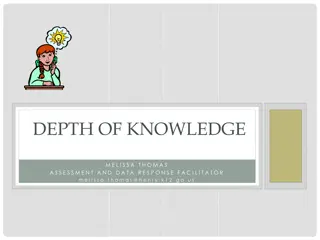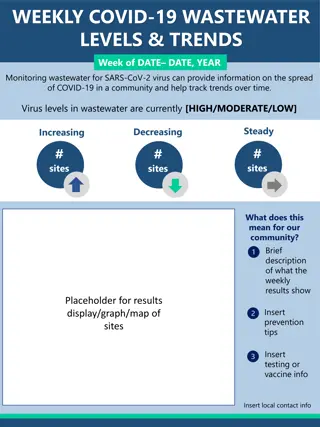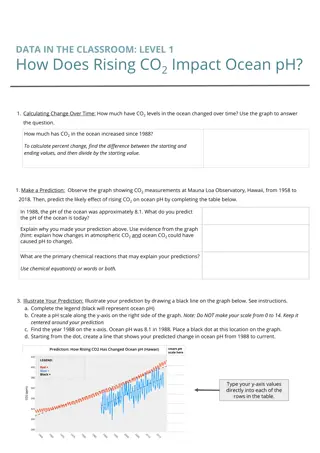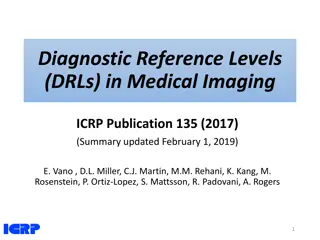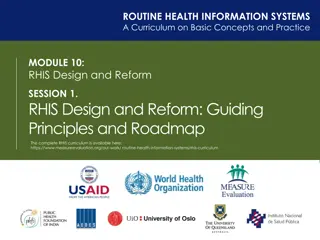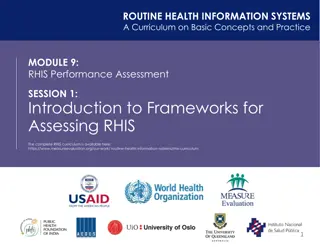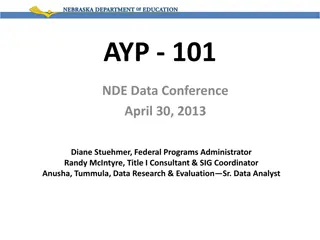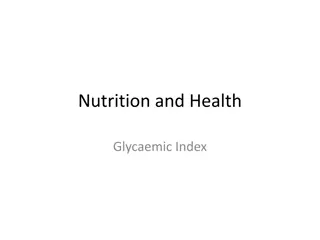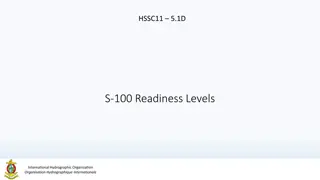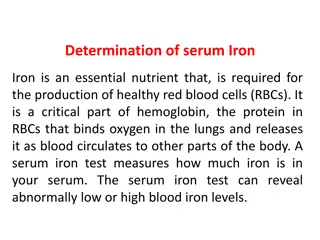Managing RHIS Resources: Governance and Mobilization
Governance and management of resources in routine health information systems (RHIS), covering topics such as human resources, financial resources, and physical resources. Participants will learn about workforce needs, training infrastructure, budgeting, procurement, and maintenance. The module also
1 views • 15 slides
RHIS Performance Assessment: Frameworks and Tools
Learn how to assess Routine Health Information System performance through frameworks, standards, and tools. This module covers diagnosing system performance and using assessment tools for effective implementation. Enhance your understanding of RHIS with practical applications.
1 views • 6 slides
Buy GOETHE certificate Online - desechtedokument.com
\nGOETHE certificate for sale. The Goethe German Certificate is a language certificate recognized worldwide. It certifies the successful completion of a Goethe certificate and the ability to communicate in German in everyday situations and in professional contexts.\n\nThe exam can be taken at differ
2 views • 3 slides
Buy GOETHE certificate Online - desechtedokument
GOETHE certificate for sale. The Goethe German Certificate is a language certificate recognized worldwide. It certifies the successful completion of a Goethe certificate and the ability to communicate in German in everyday situations and in professional contexts.\n\nThe exam can be taken at differen
3 views • 3 slides
Buy AED 200 Online - globcoff.com
Buy AED 200 Online. Globcoff is the number one online tool for the best online purchases at a minimal rate. Recent patterns are the fake money online, with the average people buying all the joy they desire. Compared to other fake money suppliers, Globcoff offers AED 200 for sale online\nThe exam can
4 views • 2 slides
Overview of PRISM Assessment Tools in Routine Health Information Systems
This module provides a comprehensive overview of the PRISM assessment tools used for evaluating and improving the performance of Routine Health Information Systems (RHIS). The PRISM tool set includes six tools designed to establish performance baselines, identify influencing factors, prioritize inte
1 views • 36 slides
Basic Concepts and Practice of Information and Communication Technology for RHIS
This module is part of the RHIS curriculum and focuses on providing a solid foundation in Information and Communication Technology for Routine Health Information Systems. It covers key concepts and practical applications to enhance data management and communication within the healthcare system.
1 views • 6 slides
Understanding Manufacturing Readiness Levels (MRLs) in Defense Technology
Manufacturing Readiness Levels (MRLs) are a vital tool in assessing the manufacturing maturity and associated risks of technology and products in defense acquisitions. They provide decision-makers with a common understanding of the maturity levels to support informed decisions throughout the acquisi
1 views • 12 slides
Understanding the Economic and Health Impacts of Groundwater Nitrate Contamination in Nebraska
The economic and health costs of groundwater nitrate contamination in Nebraska highlight the challenges of ensuring safe drinking water. Despite largely safe levels, proactive strategies are essential due to rising nitrate levels and costly maintenance efforts. The compliance record shows progress i
0 views • 18 slides
Hyperparathyroidism
Hyperparathyroidism is characterized by overactive parathyroid glands leading to excessive secretion of parathyroid hormone and elevated blood calcium levels. This condition can cause symptoms like excessive urination, abdominal pain, weakness, and more. Primary hyperparathyroidism is often due to n
0 views • 20 slides
RHIS Module 5: Data Analysis Essentials
Delve into the fundamental concepts of data analysis in Routine Health Information Systems (RHIS) Module 5. Learn to select indicators, analyze data, and communicate key findings effectively. Explore key references for further insights on health facility data, data quality, and effective data presen
4 views • 6 slides
Understanding Special Monthly Compensation (SMC) Levels and Benefits
Special Monthly Compensation (SMC) offers various levels of benefits based on the extent of service-related disabilities, such as anatomical losses, blindness, and aid and attendance needs. Veterans may receive different SMC levels like SMC-K, L, M, N, and O depending on the severity and combination
1 views • 42 slides
Dissolved Oxygen Measurements and Factors Affecting Oxygen Levels
Understanding the importance of dissolved oxygen in water is crucial for the survival of aquatic plants and animals. Factors such as chemical reactions, temperature, pressure, and light penetration influence oxygen levels. The Winkler method is commonly used for dissolved oxygen measurements. This m
4 views • 11 slides
Understanding Total Solids and Total Suspended Solids in Water
Learn about total solids and total suspended solids in water, including their definitions, implications on water quality and aquatic life, and factors affecting their levels. Total solids refer to matter suspended or dissolved in water, while total suspended solids are small solid particles that can
7 views • 12 slides
Understanding Hyperfine Interactions in Atomic Physics
Hyperfine interactions play a crucial role in atomic physics, leading to small energy shifts and splitting of degenerate levels in atoms and molecules. These interactions involve the electromagnetic multipole interactions between the nucleus and electron clouds, resulting in the splitting of energy
12 views • 154 slides
Case Study: Managing High HbA1c and Normal Fasting Glucose Levels
A case study discusses a 69-year-old woman with a history of stable diabetes facing elevated HbA1c levels despite normal fasting glucose. Initial investigations, including a day curve test, reveal high postprandial glucose levels. The analysis leads to identifying iron deficiency anemia, prompting f
9 views • 22 slides
Depth of Knowledge
Explore the concept of academic rigor and the Depth of Knowledge (DOK) levels created by Dr. Norman Webb. DOK levels range from basic recall to extended thinking, emphasizing different cognitive skills and complexity. Rigorous learning involves deep mastery of challenging tasks, fostering critical t
5 views • 27 slides
Maintaining Dissolved Oxygen Levels for Black Bass in Livewells
Dissolved oxygen is crucial for the health of black bass in livewells, especially during warmer months. This presentation explores the importance of oxygen equipment to maintain sufficient oxygen levels, recommends system components, and provides guidelines for installation, operation, and safety me
0 views • 14 slides
Weekly COVID-19 Wastewater Levels & Trends - Monitoring and Analysis Report
Monitoring wastewater for SARS-CoV-2 virus levels provides crucial insights into COVID-19 spread and trend tracking in the community. The latest report for the week of October 16-22, 2022, shows moderate virus levels in wastewater with steady, decreasing, and increasing trends across different sites
0 views • 4 slides
Understanding Ocean pH Changes Due to Rising CO2 Levels
Explore the impact of rising CO2 levels on ocean pH through data analysis, predictions, and comparisons. Learn how to calculate changes over time, predict pH levels, and understand the processes influencing ocean acidification at different locations. Dive into levels ranging from measuring changes i
0 views • 6 slides
Understanding Force Protection and FPCON Levels in the US Military
Force Protection (FP) involves preventive measures in the US military to mitigate hostile actions. FPCON is a system to respond to terrorist threats against military facilities by determining security levels. FPCON levels vary from Normal to Delta based on the assessed threat level. The purpose of F
1 views • 13 slides
Managing Blood Sugar Levels at Home for Low/No Vision
Explore the importance of monitoring blood glucose levels at home for individuals with low/no vision, learn about talking blood glucose meters, and make continuous glucose monitors accessible. Understand why maintaining blood sugar levels is crucial to prevent complications in diabetes, and get tips
2 views • 25 slides
Hosting a Staff Briefing About T Levels
This slide deck, designed by the DfE T Levels Team, is a resource for schools/colleges conducting a staff briefing on T Levels. It aims to generate interest and positivity among staff about T Levels, providing a customizable presentation that can be delivered in 20-30 minutes. The deck includes note
1 views • 29 slides
Diagnostic Reference Levels in Medical Imaging and Radiation Protection
The concept of Diagnostic Reference Levels (DRLs) is crucial in evaluating the amount of ionizing radiation used in medical imaging procedures. DRLs help determine if radiation levels are appropriate and need optimization. Authorized bodies establish numerical DRL values as advisory guidelines. Loca
1 views • 26 slides
RHIS Design and Reform: Guiding Principles and Roadmap
This module discusses the Design and Reform of Routine Health Information Systems (RHIS), focusing on the six components of an RHIS and the guiding principles for RHIS development/strengthening. It covers topics such as inputs, processes, outputs, stakeholder engagement, country leadership, sustaina
0 views • 8 slides
Understanding T Levels in Higher Education
T Levels are a new type of two-year technical education courses designed for 16-19 year-olds, focusing on a blend of classroom learning and industry experience to prepare students for skilled employment or further study. Developed in collaboration with employers, T Levels offer a more rigorous and s
1 views • 14 slides
Understanding RHIS Performance Assessment Frameworks
Explore the concepts and practices related to Routine Health Information Systems (RHIS) performance assessment through this curriculum. Learn about RHIS standards, performance factors, and frameworks for assessing performance. Engage in group exercises to identify underlying problems and causes in R
7 views • 16 slides
Understanding Low Testosterone Levels and Treatment Options for Men
Testosterone is a vital steroid hormone that plays a key role in the development of male characteristics. Low testosterone levels can lead to various health effects, including decreased muscle mass, bone density, and libido. Testosterone replacement therapy (TRT) is commonly used to treat males with
0 views • 36 slides
Understanding AYP in Education: Goals, Subgroups, and Performance Levels
AYP (Adequate Yearly Progress) is a measurement used in education to assess schools' performance in meeting academic standards. AYP is calculated at both building and district levels based on various subgroups such as race, income level, and English proficiency. This assessment includes recently arr
0 views • 57 slides
Guidelines on EPA Region 9 Response Action Levels for TCE Contamination
EPA Region 9 has established response action levels for TCE contamination, with tiered concentrations for different exposure scenarios. The State of California provides guidance aligned with these levels. DTSC concurs with EPA's residential and industrial response levels but recommends consultation
0 views • 10 slides
Understanding Glycaemic Index in Nutrition and Health
Glycaemic Index (GI) measures how carbohydrate-containing foods affect blood glucose levels. High GI foods raise blood glucose rapidly, while low GI foods release glucose gradually. Studies track impacts on blood glucose levels, insulin secretion, fat storage, and pancreatic function. High GI foods
0 views • 15 slides
Understanding Blooms Taxonomy in Educational Settings
In the classroom, understanding Bloom's Taxonomy is essential for effective teaching and learning. This taxonomy, created by Benjamin Bloom, categorizes levels of thinking skills from basic memorization to higher-order critical thinking. The revised Bloom's Taxonomy emphasizes the importance of prog
0 views • 24 slides
Understanding S-100 Readiness Levels for Product Development
The concept of S-100 Readiness Levels, based on NASA's Technical Readiness Levels, is crucial for progressing ideas from research to regular product use. This framework, introduced by the International Hydrographic Organization, ensures a clear understanding of a specification's readiness for operat
0 views • 9 slides
Enhancing Missing Children Process in Surrey: Importance of Return Home Interviews
The missing children process in Surrey emphasizes the significance of Return Home Interviews (RHIs) within 72 hours of a child's return home. RHIs provide insights into the child's perspective, vulnerabilities, and necessary support. Police involvement, prevention checks, and intelligence gathered f
0 views • 30 slides
Understanding Bloom's Taxonomy: A Guide to Cognitive Levels
Blooms Taxonomy, developed by Benjamin Bloom, categorizes thinking into six cognitive levels, from remembering to creating. The original taxonomy includes knowledge, comprehension, and application as lower levels, and analysis, synthesis, and evaluation as higher levels. In the revised version, the
0 views • 10 slides
Understanding Serum Iron Levels and Implications
Iron is essential for healthy red blood cell production, with serum iron tests measuring iron levels in the blood. Abnormal levels can indicate conditions like iron deficiency or iron overload, leading to symptoms such as fatigue, weakness, and more serious complications. Knowing normal ranges and i
0 views • 8 slides
Overview of Georgia Milestones Assessment for 4th Grade Students
This content provides an insightful overview of the Georgia Milestones assessment for 4th-grade students. It covers the assessment format, content areas such as Reading/ELA and Math, achievement levels, and descriptors to gauge academic proficiency levels. The information includes details on what Ge
0 views • 14 slides
Understanding Methanol Metabolism and Blood Levels
This content discusses the difference between background/endogenous and exogenous methanol, how metabolism of endogenous methanol affects exogenous metabolism, and the impact of exposure to different levels of methanol on blood concentrations. It highlights EPA PBPK models and assumptions regarding
0 views • 16 slides
Understanding Isolation Levels in Database Management Systems
Isolation levels in database management systems provide a way to balance performance and correctness by offering various levels of data isolation. These levels determine the degree to which transactions can interact with each other, addressing conflicts such as dirty reads, non-repeatable reads, and
0 views • 18 slides
S-98 Interoperability Scopes Overview
This paper discusses options for defining interoperability scopes, restructuring the draft S-98 interoperability specification, and assessing the implications of implementing different levels of interoperability. It suggests a phased introduction with pauses for evaluation, focusing on lower complex
0 views • 8 slides
